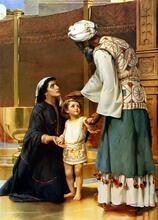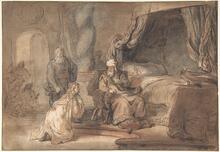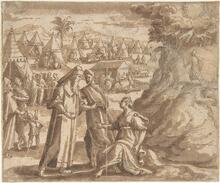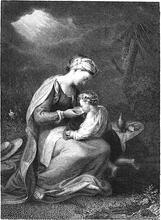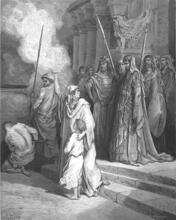Mother of Micah: Bible
When a nameless woman’s money is stolen, she utters a curse. Her son Micah, who is the thief, returns the money. She uses the money to install a shrine with idols and later to hire a Levite as a priest. This short story is a rare insight into ancient Israelite domestic religious practice and the important role women had as leaders of household worship.
Article
A woman living in the hill country of Ephraim in the period of the judges discovers that eleven hundred pieces of silver have been stolen from her. She then utters a curse (Hebrew alah) in the hearing of her son Micah, who is the thief. The wording of the curse is not preserved, although that of a subsequent blessing appears in v. 3. The curse, which must have had a formulaic quality similar to that of the blessing, would have proclaimed her hope that God would punish the thief. Micah immediately confesses his theft and returns the sum—a goodly amount, indicating a prosperous household—thereby escaping God’s punishment.
Apparently if a curse was spoken audibly (compare Lev 5:1, “audible curse”; NRSV, “public adjuration”), it constituted a conditional rather than an absolute imprecation: it allowed the guilty party to come forth and make restitution (in the case of theft). The use of both blessing and cursing formulas were part of ancient Near Eastern legal tradition, used either to protect property or to attempt to establish guilt. The mother of Micah clearly is presented as having the right to utter a legally valid imprecation; indeed this text is the only biblical narrative that presents a property-protection use of a curse.
The story does not end with the return of the stolen property. The woman decides that the silver, or at least a portion of it (two hundred pieces), should be consecrated to YHWH. She goes to a silversmith and commissions an “idol of cast metal” (v. 4). The idol is subsequently installed in the household shrine, which includes two other cult objects (an ephod and teraphim) and, eventually, a resident priestly officiant (Judg 17:7–13). This incident provides a rare glimpse into household, or private, religion. Most of the Hebrew Bible’s cultic texts concern official public practices at the tabernacle or temple. Yet ancient Israelite religion in its totality included domestic as well as the more visible official practices. The narrative of Micah’s mother, along with several other texts, indicates that women were major participants in household religious activities in ancient Israel, as is typically the case in traditional societies. It also suggests that women had some control over household assets.
Bird, Phyllis. “The Place of Women in the Israelite Cultus.” In Ancient Israelite Religion: Essays in Honor of Frank Moore Cross, edited by Patrick D. Miller, Jr., Paul D. Hanson, and S. Dean McBride, 397–419. Philadelphia: 1987.
Women in Scripture, Carol Meyers, General Editor (2000).

